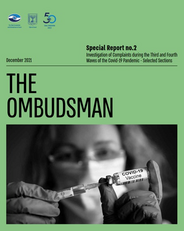The special report details the handling of complaints relating to the Covid-19 crisis that were received by the Office from 1 December 2020 to 15 October 2021. This report follows two previous reports that were published by the State Comptroller and Ombudsman dealing with the first wave of the pandemic (15 March 2020 to 30 June 2020) and with all the complaints received in 2020, including data on the Covid-19 crisis in 2020.
During the period of the latest special report - concerning the third and fourth waves - 16,191 complaints were received by the Office, of which 1,687 related to Covid-19. This constitutes an approx. 36% drop in the number of complaints received relating to the pandemic, as compared with the nine months of the first and second waves, during which 2,637 complaints relating to the crisis were received.
A comparison of the data in this report with those of the previous two reports relating to the pandemic, reflect the shift from a state of emergency to a state of "living with Covid-19". This is reflected in the fact that the complaints in the third and fourth waves concern not only the demand for social security - material assistance and the receipt of benefits and grants - but also the managing of a daily routine alongside Covid-19 - leaving and entering Israel, participation in events within the restrictions of the Green Pass, etc.
According to State Comptroller and Ombudsman, Matanyahu Englman: "The way the State of Israel handled the Covid-19 crisis is well reflected in the complaints investigated. The Office was an address for complainants in almost all their interactions with the authorities and strived, first and foremost, to provide swift relief for the complainants… I urge all government bodies to take heed of the lessons learned from the issues raised in the report and to answer the needs of those turning to them quickly and optimally".
The special report was published on a fast day on which Jews remember the victims of the Holocaust whose date of death is unknown. In this context, it is appropriate to point out that during the Covid-19 crisis, the Office of the Ombudsman adopted a special initiative whereby staff of the Office made contact with Holocaust survivors who had in the past filed complaints with the Office, asking how they were faring and if they needed assistance. This reflects the special importance that the Office attaches to the handling of complaints of older people and especially of Holocaust survivors.
Source: State Comptroller and Ombudsman of Israel

